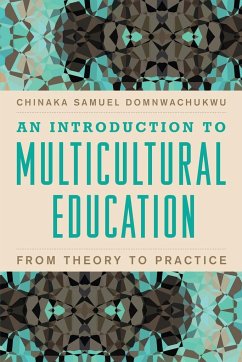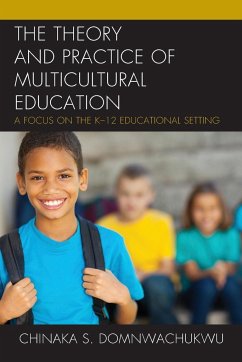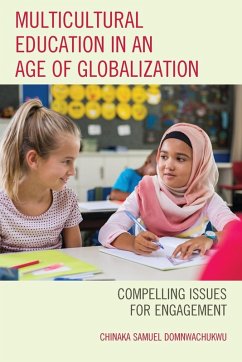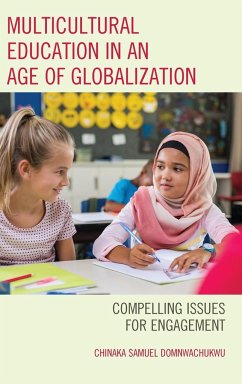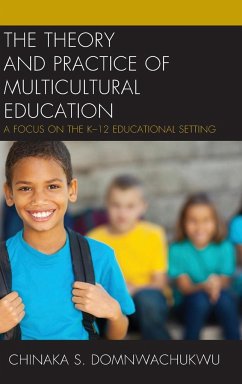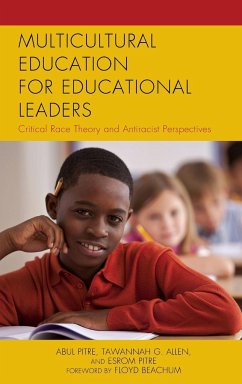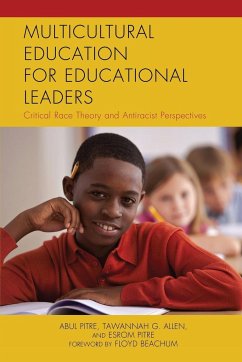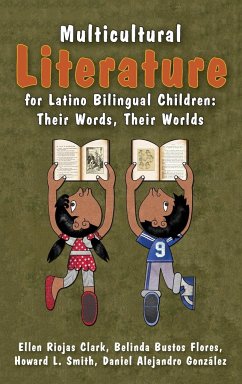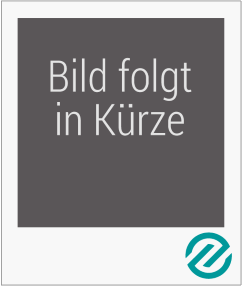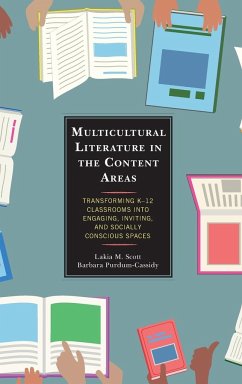Chinaka S. Domnwachukwu
Gebundenes Buch
Introduction to Multicultural Education
From Theory to Practice
Versandkostenfrei!
Versandfertig in 1-2 Wochen
Weitere Ausgaben:

PAYBACK Punkte
59 °P sammeln!





This book demonstrates a balance between the principles and practice of multicultural education in the K-12 classroom, presenting multicultural education as a learner-centered pedagogy. The author provides pre-service and in-service teachers with the theoretical and practical support they need to provide equal and meaningful education to all the students in their classrooms.
Chinaka S. DomNwachukwu is a Professor of Multicultural Education and Associate Dean for Diversity and Values at the School of Education, Azusa Pacific University in Azusa, California. Among his many publications is An Introduction to Multicultural Education: From Theory to Practice, and Multiculturalism: A Shalom Motif for the Christian Community
Produktdetails
- Verlag: Rowman & Littlefield Publishers
- Seitenzahl: 300
- Erscheinungstermin: 16. April 2010
- Englisch
- Abmessung: 235mm x 157mm x 22mm
- Gewicht: 640g
- ISBN-13: 9781607096832
- ISBN-10: 1607096838
- Artikelnr.: 28203397
Herstellerkennzeichnung
Libri GmbH
Europaallee 1
36244 Bad Hersfeld
gpsr@libri.de
DomNwachukwu finds it unfortunate that this nation has not resolved the 'dynamics of her plurality as it affects the education of children who are recent immigrants,' and its continued denial that multilingualism and multiculturalism are intrinsic parts of its national identity. -- Reynaldo Baca, clinical professor of education and codirector of the Center for Multilingual, Multicultural Research, University of Southern Ca DomNwachukwu's book is an effective contribution to demystifying multicultural education in a manner that provides readers with step-by-step procedures for use in their classrooms, all within the context of an authentic historical perspective and commitment to social justice. Through the use of reflective writing,
Mehr anzeigen
narratives, and suggested activities, readers are guided to link classroom applications to their own inner journeys. This book is unique in its ability to talk to the new and veteran teacher,the elementary and secondary teacher, and the teacher with culturally homogeneous or culturally heterogeneous classes. DomNwachukwu has provided a straightforward, uncluttered presentation of multicultural education that will serve candidates in schools of education as well as participants in school districts' professional development needs.. -- Randall B. Lindsey, professor emeritus, California State University, Los Angeles An Introduction to Multicultural Education by Chinaka Samuel DomNwachukwu is an amazingly comprehensive, direct, personal, and inviting discussion of the conditions, challenges, and possibilities for equitable schooling in our nation. The author mixes well-documented history, a wide range of contemporary sources, pertinent case studies, and his own personal commitment to effective education. His early chapter on culture is informative and insightful in its approach, and his historical review of multicultural education sets the stage for later chapters on English-language learners, religious diversity, women's rights, and exceptionality, as each of those topics stretches and helps define the effective practice of multicultural education. The book concludes with a practical discussion of multicultural education in the context of standards-based accountability. This is an important book that moves multicultural education theory and practice forward in twenty-first-century American schools.. -- Alan H. Jones, editor of Multicultural Education; executive secretary of the California Council on Teacher Education An Introduction to Multicultural Education by Chinaka Samuel DomNwachukwu is an amazingly comprehensive, direct, personal, and inviting discussion of the conditions, challenges, and possibilities for equitable schooling in our nation. The author mixes well-documented history, a wide range of contemporary sources, pertinent case studies, and his own personal commitment to effective education. His early chapter on culture is informative and insightful in its approach, and his historical review of multicultural education sets the stage for later chapters on English-language learners, religious diversity, women's rights, and exceptionality, as each of those topics stretches and helps define the effective practice of multicultural education. The book concludes with a practical discussion of multicultural education in the context of standards-based accountability. This is an important book that moves multicultural education theory and practice forward in twenty-first-century American schools. -- Alan H. Jones, editor of Multicultural Education; executive secretary of the California Council on Teacher Education DomNwachukwu's book is an effective contribution to demystifying multicultural education in a manner that provides readers with step-by-step procedures for use in their classrooms, all within the context of an authentic historical perspective and commitment to social justice. Through the use of reflective writing, narratives, and suggested activities, readers are guided to link classroom applications to their own inner journeys. This book is unique in its ability to talk to the new and veteran teacher, the elementary and secondary teacher, and the teacher with culturally homogeneous or culturally heterogeneous classes. DomNwachukwu has provided a straightforward, uncluttered presentation of multicultural education that will serve candidates in schools of education as well as participants in school districts' professional development needs. -- Randall B. Lindsey, professor emeritus, California State University, Los Angeles
Schließen
Für dieses Produkt wurde noch keine Bewertung abgegeben. Wir würden uns sehr freuen, wenn du die erste Bewertung schreibst!
Eine Bewertung schreiben
Eine Bewertung schreiben
Andere Kunden interessierten sich für




